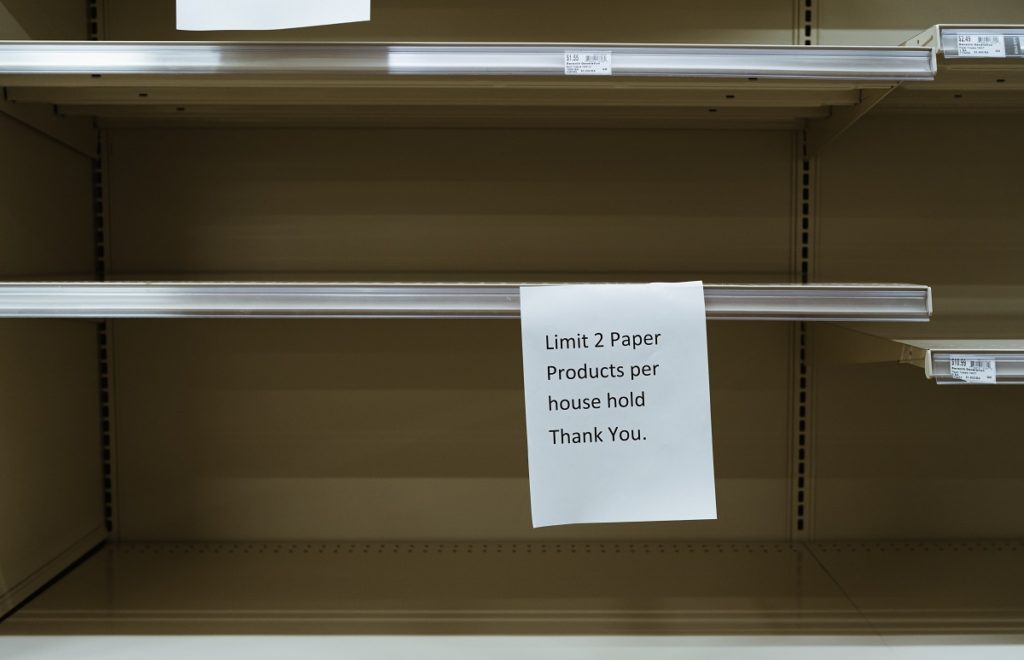by Marie Bruce

Last month we looked at the impact of the coronavirus on families. This month I want to explore how you can protect your life from any kind of disaster, or prolonged period of unrest, because when the unexpected happens, it pays to be as prepared as possible. Eventually, the threat of COVID-19 will pass, but when it does we will have to assimilate ourselves with another ‘new normal’.
Predictions are that the global economy is likely to suffer due to the virus, so with the prospect of a recession or depression on the horizon, you need to start planning ahead now. We could even be in for another decade of harsh austerity measures, as the government begins to claw back the money it has been forced to spend during the pandemic to keep the country afloat. At some stage, that generosity will have to be paid for by all of us.
So, how do you prepare for the unexpected event that turns day to day life upside down? You prepare by future-proofing your life as much as possible. By this I mean that you put things in place to ensure that you and your family will be able to get through a period of uncertainty, scarcity, adverse weather or disaster.
People who live in rural communities tend to do this better than those who live in cities, because country dwellers know that a heavy snow storm could cut them off for weeks, so they make sure that they have a full freezer before the first flake falls. City dwellers, however, are so used to being able to get whatever they want, whenever they want it that, in some ways, they have lost the art of planning ahead – hence the panic buying that preceded the recent lock-down!
The trick is to be a responder, not a reactor. Those who respond to a situation keep an eye on events, anticipate the most likely outcome, identifying how it will affect them and their family, and then take action before events overtake them.
Those who react watch in growing anxiety before following the crowd in terror. We saw this clearly in the supermarkets prior to lock-down. The responders did their shopping in plenty of time, filling their cupboards while the shelves were still full, while the reactors waited until the situation had already started to unfold, before heading out in droves and stripping the shelves in a panic-buying frenzy. It is the reactors who turned toilet roll into a luxury item!
Try to develop the characteristics of a responder. Keep a weather eye on the global situation and identify how it might affect you. Conflict on the other side of the world could affect you if you are of a military family for instance, or if it interrupts the flow of goods such as oil, meaning that the price of petrol could increase. Then make plans as to how you will deal with that change. In the examples given here, this could mean preparing the children for the possibility of a separation from their soldier parent, or it could be as simple as increasing your personal budget for petrol now, rather than waiting until the price increases and being taken by surprise at the pump.
In addition, future-proof your life by planning ahead. Many things that are beyond your control can impact your life. Flooding, heavy snow, a terrorist attack, a virus pandemic etc., can all have an effect on us, but understanding how to plan for such events as a precaution, can help you to mitigate the negative impact of such circumstances. In any disaster there are several things that you should have in place; food, water, fuel, cash, a safe shelter, basic medicines. Let’s look at each one in turn.
Food and water
In the past housewives would shop for their store cupboard, rather than for their current weekly groceries as we tend to do. So with the exception of fresh produce, try to shop for storage whenever you can and steadily build up a store cupboard that Jamie Oliver would be proud of. This means that there will be no need to go out panic-buying, as you will already have a cupboard and freezer full of food and essentials to keep you going for a while, should the worst happen. Remember too, that in any difficult situation, it tends to be the least expensive foods that sell out first, so try to ensure that you keep your store cupboard well-supplied with canned goods all year round. Don’t forget to add pet food and litter if required. This way you can feed your family and help out a neighbour or two if chaos reigns or you get snowed in.
Fuel
Make sure that your fuel bills are paid up to date by setting up direct debits or standing orders. These are essential bills and must come before any debt payments. Also keep a good supply of basic candles and candlesticks in the house at all times, then if you have a power cut, you can still light up a room and keep warm. In addition, keep £10 tucked out of sight in your car, just in case you run low on petrol two days before payday!
Cash
We may be moving towards a cashless society but it is always a good idea to have a modest amount of cash that you have easy access to, perhaps in a cashbox tucked away somewhere in the house. Then if the websites crash or the banks close, as they have done recently, you will still have some money to hand. It is important to have savings for many reasons, as I explained in an earlier column, but it is never more so than in an unexpected situation. Many people have recently lost their jobs, but how many of them have the recommended six months’ salary in savings that they can fall back on? Those with wealth tend to weather a storm better than those in poverty, so start to build your wealth and top up your savings account each month, to ward away feelings of destitution.
Safe Shelter
Your home is your safe shelter so make sure that it is paid for! Never miss a rent or mortgage payment, unless previously arranged with the bank/landlord, as you’re just setting up problems for the future. This is your main priority expense, along with fuel bills and food. Keep your home in good repair and make it an environment that is pleasant to be in. A comfortable home should feel like a safe, happy retreat from the world. If it feels like a trap, then you need to work on creating a nicer environment for yourself. Make sure windows, doors and garden gates are secure, never ignore a dripping pipe, keep drains and gutters free from debris and avoid overcrowding.
Basic medicines
Do you have a first aid box and is it fully stocked? How about basic medicines and cold and flu remedies? Plasters, a freezer pack for burns, a bandage for sprains, sanitary items? The recent rush on paracetamol should be a lesson in keeping a well-stocked medicine and first aid cabinet at all times.
Finally, it’s a good idea to keep all your essential paperwork in a steal box. Things like passports, birth, marriage and education certificates, insurance papers, car documents, medical records, TV licence, essential phone numbers of services, family and friends, pet records and microchip details, bank details for all your accounts and credit cards, driving license numbers etc. Keep all these items together in a locked box, along with a torch and some batteries, a box of tampons, essential medicines needed by the family and a spare mobile phone charger. That way, not only will you always know where to find them, but if you need to leave the house in a hurry, say in a flood, you will be able to take all your essentials with you quickly.
And remember, it’s not about being paranoid – it’s about being prepared. Bad things happen to good people sometimes, but if you have future-proofed your life against unforeseen circumstances, then you will be able to weather any of life’s storms with as much grace as WW2 icon, Mrs. Miniver.
Until next month,
Serene Blessings
Marie Bruce x
 About the author:
About the author:
Marie Bruce Dip. T.C. MBACP is a qualified psychotherapist, Cruse Bereavement Counsellor and best-selling self-help author. She specialises in grief and loss counselling, PTSD and military counselling, and life coaching.
In this monthly column, Marie offers simple tools used by therapists to help clients and readers improve their mental well-being.
Marie’s books are available on Amazon UK.
More from this author:
Creative Counselling: Lock-Down Low-Down
Creative Counselling: The Art of Contentment
Creative Counselling: Pet Bereavement
 About the author:
About the author: